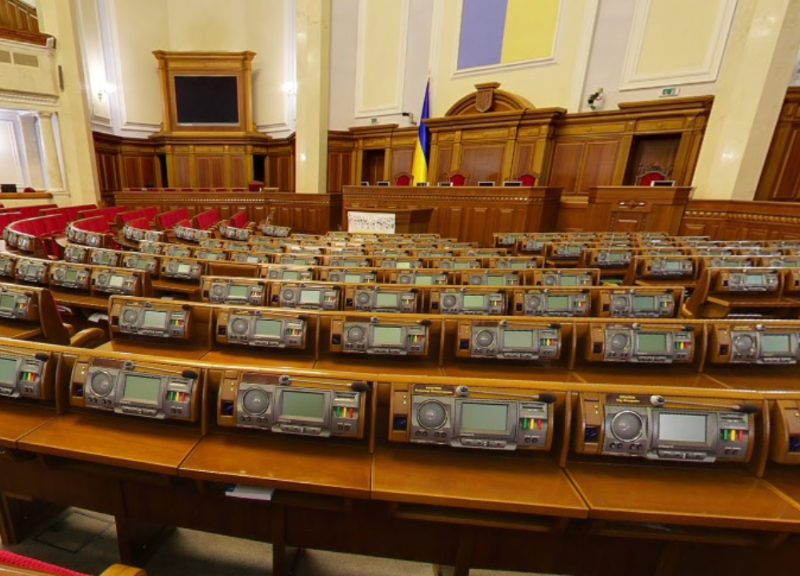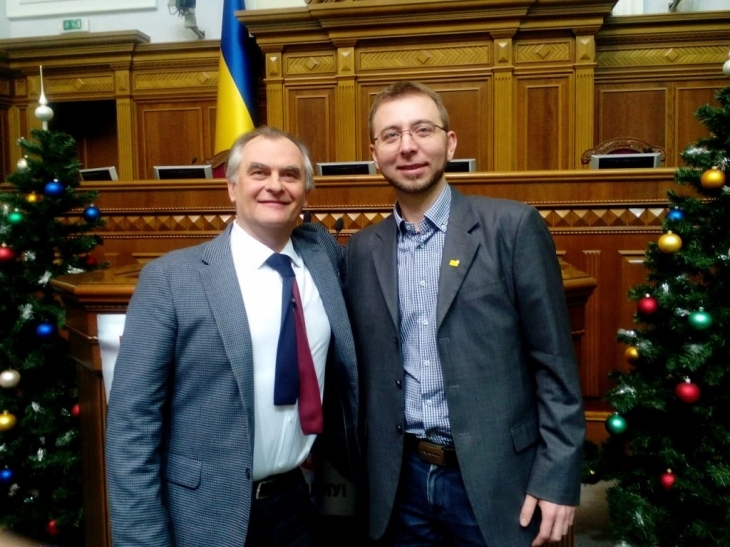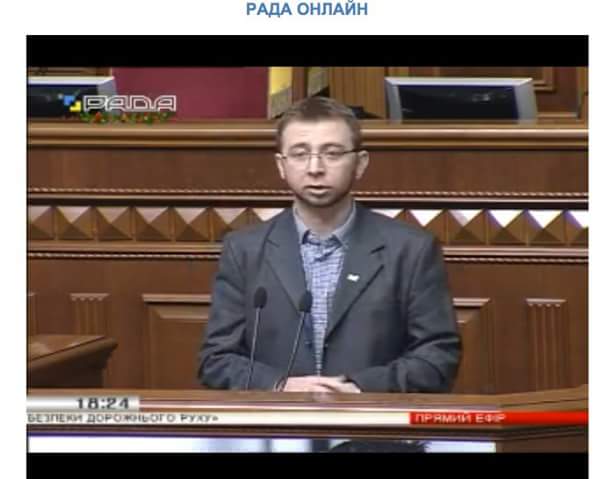
On December 23, 2015, the founder of "Vision Zero" Viktor Zagreba had the opportunity to speak from the rostrum of the Verkhovna Rada at a parliamentary hearing dedicated to road safety. Below is the text of Viktor's speech, slides, as well as some of his "first-person" explanations.

Activists Viktor Zagreba and Kostyantyn Skipor, who developed and delivered a lecture on traffic safety for future Frankivsk police officers. Verkhovna Rada of Ukraine
Good afternoon! Thank you for the opportunity to speak at these hearings! A few days ago, journalist Serhiy Chernikov, whose photo you see on the screen, died. He was hit by a car at the intersection in the center of Kyiv, on the corner of Saksagansky and Lev Tolstoy streets. Serhiy is survived by his wife, two children, friends, and colleagues. He had many plans that he will no longer be able to realize. For me, this person personifies those three and a half thousand other people who have died on the roads and streets since the beginning of the year and whose names we do not know. We are now talking about some indicators, numbers, statistics. But let's remember that we are actually not talking about some abstract numbers here, but about the fates of real people who had many plans and could be living right now. Therefore, I dedicate this speech to Serhiy Chernikov and all the others who have died on the roads since the beginning of the year.

Today, the phrase "war on the roads" and its comparison with the war in the East have been heard several times from this rostrum. In many ways, these two wars are indeed similar, in particular in the number of victims and material losses for society. However, there is a big difference. In the "Eastern war", death and injury are inevitable, because there is no war without victims. But in peaceful life, on the streets of cities and villages, these deaths ARE NOT necessary. Road accidents are not some kind of natural disaster. These are logical, predictable, expected events. Science has proven that over 95% of road accidents can be prevented. Look at this figure. Almost all of these people, and Serhiy Chernikov, could be alive now. I think we all equally want the war in the East to end as soon as possible, so that there is no more shooting and deaths. We are mobilizing all resources for this - both state, volunteer, and international. We should also strive for a similar goal in the war on the roads. My public initiative is called "Vision Zero for Ukraine", which means that our goal is zero deaths in road accidents. This is not a utopia. At the state level, no EU country has yet achieved this, although some have already come close. But at the city level, this is common practice. More than 700 large cities in the world, with a population of 50 to 500 thousand people, have already achieved this vision. I believe that this is realistic for Ukrainian cities, and I urge you to set exactly such a goal - not a ten or twenty percent reduction in mortality, but to zero. People should not die on the streets of cities.
Now a few words about roads. In Ukraine, they like to talk about roads, that they are bad in our country, and that is why there are so many deaths. I want to ask you: is this M-06 highway "Kyiv - Chop", good or bad? Most will say that it is a very good road, one of the best in Ukraine. It is flat, has two lanes, good markings, and you can drive on it quickly and comfortably. But how do we determine what a good or high-quality road is? I propose the following formula:
QUALITY road = SMOOTH road × SAFE road
If the road is flat and has no potholes, but there is no safety on it (the indicator is "zero"), then the result of the formula is zero: it is a bad road. And vice versa: think of some very bad road that you have had to drive on recently. I guarantee you that it is very safe - most likely, there was not a single fatality on it in a whole year. But the result according to the formula will still be zero: there is safety, but there is no equality. If you multiply by zero, you get zero. Both of these roads are actually bad, just in different ways.
About traffic safety in Ukraine from Viktor Zagreba
Last year, 177 people died on the Kyiv-Chop highway, or an average of one corpse per four and a half kilometers. The next time you drive towards Lviv and listen to music, remember: the end of each music track means that someone died here. How many songs you listen to during your trip, so many conditional graves stand on this road. In just one year! This is a very bad road. I call on the Ministry of Infrastructure and all road and project organizations to change their understanding of a “quality road”. In fact, a quality road is not just flat, without potholes. It is flat, which is also safe. A flat asphalt road on which thousands of people die is NOT a European road. This is a shame and a crime of office for all who created it.
The next thing is about the patrol police. I personally believe in this reform, I really respect all the people who implement it, who serve as patrol officers or are preparing to become them. They work under tight deadlines and a lot of pressure, so I don't want to criticize them in any way. But there is a big problem with the new patrol service: our "cops" don't know how to drive! Look at this news - 26 patrol cars have been broken into since the police started working. This is news from September, now there are even more. I know that the training program for patrol officers is very short and intensive - only two months. But despite this, it should include driving lessons and studying the topic of road safety. My colleague Kostyantyn Skipor, who is also present at these hearings, and I, on a volunteer basis, developed a short two-and-a-half-hour lecture on road safety and last week we read it to future patrol officers in Ivano-Frankivsk. We then conducted a survey of the audience, and almost all the patrol officers admitted that even one of our short lectures was very useful and that they lacked this knowledge.
And also, I turn to the head of the Patrol Police present here - almost 100% of future patrol officers say that they really need practical lessons in driving skills and traffic safety. Let's be honest: the fact that these young guys and girls have a driver's license does not mean that they can drive well. Less than half of them have their own cars. Most of them received their "rights" recently or a long time ago, but have never used them. Think about it: future cops are taught for 36 hours how to wring hands and handcuff violators. And another 36 hours how to use weapons. They will not have to do this often, but they will have to drive a car and monitor traffic safety for many hours in a row every day. How many of them are taught this? They are not taught at all! I call on the leadership of the Ministry of Internal Affairs and the representatives of the Patrol Police present here to urgently review the program and add these necessary courses to it. As activists, we are ready to help in any way we can. The last one. I was going to give some practical recommendations, but then I realized that it didn't make sense. Most of the people here have known them for a long time, and our British speaker (Alan Ross, head of EU-funded project TRACECA) reminded them of them beautifully once again. Therefore, I want to end my speech with a thesis about responsibility. Someone is responsible for every war and its victims. For the war in the East, it is the ruling regime in Russia, I think we all agree here. Who is responsible for the victims of the war on the roads?
Some participants in today's hearings believe that it is the local authorities. Many of those present here place responsibility on the victims of the road accident themselves - someone was driving too fast, someone was drunk, and so on. In my opinion, this is meaningless. I argue that the heads of the executive branch of government in Ukraine, namely Prime Minister Arseniy Yatsenyuk and President Petro Poroshenko, bear personal responsibility for these thousands of lost human lives. They now have all the powers and resources to start solving this problem, but they have done absolutely nothing. They do not have this issue on their agenda. If you look at their list of priorities, traffic safety will not even be in twentieth place. When someone knows about the future deaths of many people, has the opportunity to prevent them, but does not do it, this is called criminal inaction. This is what our political leadership is doing now. I call on the Prime Minister and the President to include the issue of ending the war on the roads among their priorities and begin real action. What needs to be done and in what sequence, where to get the resources for this - all this has long been spelled out, for example, in the recommendations of the European Union, the UN and other organizations, it was all mentioned in Alan Ross's report. I sincerely ask the heads of the executive branch to understand that this is their duty to society. Thank you for your attention and I apologize for not following the rules.
POSTSCRIPT: Those who know me a little or have read my previous articles on road safety may be surprised that my speech in the Verkhovna Rada contained almost no rational arguments and statistics, but there were many emotional appeals and moral and philosophical categories. My friend Ira Bondarenko from the Kyiv Cyclists Association even said that she did not expect "such populism" from me. So, I want to explain to you what these emotions and "populism" were for. I resorted to this technique deliberately, with very rational goals. What do we need? We need systemic changes in road safety management (and not only in this, actually). System change guru John Kotter, a professor at Harvard University, claims that the first necessary step for change is to create "urgency", that is, a sense of urgent need for change. Only then does the formation of a coalition of change agents, definition of a vision and strategy for change, communication of change to the general public, and so on. In total, Kotter formulated eight points that need to be passed for the changes to be successful. So, I suddenly realized that in the field of road safety we lack this sense of urgency. That is, I have it, you probably do too. But neither the President, nor the Government, nor the authors of the police reform, nor journalists, nor society in general, by and large, have it. For several years now, we, activists and experts, have been proposing progressive and rational visions and strategies of action (step 3 in Kotter), building coalitions among ourselves and trying to build them with ministries and departments (step 2), but in fact we have not yet completed step 1 – creating a sense of urgency for change.
Therefore, I deliberately “sharpened” my report to at least slightly strengthen this feeling, which will then allow us to effectively move on to the next steps. For some reason, statesmen and politicians do not accept rational arguments, graphs, tables and analytical reports, so this time I decided to try emotional appeals, personification of the problem and personalization of responsibility for it. Did I succeed? I hope that I succeeded at least partially. You can tell me in the comments, I ask for your critical feedback. :) Anyone interested in the theory of change in various organizations and systems, including business, I highly recommend Kotter's 8-step model. A brief description of it is here . And for a more detailed study, you should buy the book "Leading Changes" by John P. Kotter. Originally published on the KURS website on December 24, 2015.
